Cs161 - Study guides, Class notes & Summaries
Looking for the best study guides, study notes and summaries about Cs161? On this page you'll find 20 study documents about Cs161.
All 20 results
Sort by
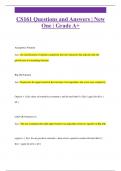
-
CS161 Questions and Answers | New One | Grade A+
- Exam (elaborations) • 44 pages • 2024
- Available in package deal
-
- $14.79
- + learn more
Asymptotic Notation Ans: the classification of runtime complexity that uses functions that indicate only the growth rate of a bounding function Big-Oh Notation Ans: Represents the upper bound of the run-time of an algorithm, aka worst-case complexity O(g(n)) = { f(n): there exist positive constants c and n0 such that 0 ≤ f(n) ≤ cg(n) for all n ≥ n0 } Little-Oh Notation (o) Ans: The not asymptotically tight upper bound of an algorithm (removes equality in Big-Oh) o(g(n)) = { f(n)...
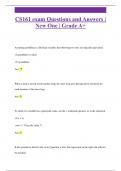
-
CS161 exam Questions and Answers | New One | Grade A+
- Exam (elaborations) • 32 pages • 2024
- Available in package deal
-
- $14.79
- + learn more
Assuming goodData is a Boolean variable, the following two tests are logically equivalent. if (goodData == false) if (!goodData) Ans: T When a loop is nested inside another loop, the outer loop goes through all its iterations for each iteration of the inner loop. Ans: F To check if a variable has a particular value, use the = relational operator, as in the statement if (s = 3) cout << "S has the value 3"; Ans: F If the operand on the left side of an || operator is true, the e...
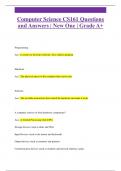
-
Computer Science CS161 Questions and Answers | New One | Grade A+
- Exam (elaborations) • 84 pages • 2024
- Available in package deal
-
- $18.79
- + learn more
Programming Ans: to create (or develop) software. Also called a program Hardware Ans: The physical aspect of the computer that can be seen Software Ans: The invisible instructions that control the hardware and make it work A computer consists of what hardware components? Ans: A Central Processing Unit (CPU) Storage devices (such as disks and CDs) Input Devices (such as the mouse and keyboard) Output devices (such as monitors and printers) Communication devices (such as modems and netw...
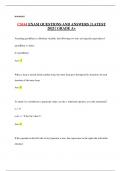
-
CS161 EXAM QUESTIONS AND ANSWERS | LATEST 2025 | GRADE A+
- Exam (elaborations) • 31 pages • 2024
-
- $13.99
- + learn more
CS161 EXAM QUESTIONS AND ANSWERS | LATEST 2025 | GRADE A+ Assuming goodData is a Boolean variable, the following two tests are logically (goodData == false) if (!goodData) Ans: T When a loop is nested inside another loop, the outer loop goes through all its iterations foreach iteration of the inner loop. Ans: F To check if a variable has a particular value, use the = relational operator, as in the statementif (s = 3) cout << "S has the value 3"; Ans: F

-
tuck cs161 2 Questions and Answers | New One | Grade A+
- Exam (elaborations) • 18 pages • 2024
- Available in package deal
-
- $13.49
- + learn more
C++ arrays check for out-of-range index values Ans: false A for-loop is a convenient way to step through an array Ans: true A recursive function is a function whose definition contains a call to the function being defined. Ans: true . A recursive function can have local variables. Ans: true Each recursion causes a new frame to be placed on the stack. Ans: true A C-string is a sequence of characters Ans: false The C-string library functions use the null terminator to decide when to ...
CS161 Questions and Answers Pack | New One | Grade A+

-
CS161 Final Questions and Answers | New One | Grade A+
- Exam (elaborations) • 4 pages • 2024
- Available in package deal
-
- $10.39
- + learn more
What is a skolem constant? Ans: Used to remove existential quantifier from FOL to transform to propositional logic. C1. What is a definite clause? Give an example Ans: A clause with exactly one positive literal. Example: - NOT A or NOTB or C - C What is a Horn Clause? Is it CNF or DNF? Ans: Clause with at most 1 positive literal. Example: - NOT A or NOT B or C - NOT A or NOT B or NOT C CNF Which tree search strategy do we use for Backward Chaining to solve first order logic? Ans: ...
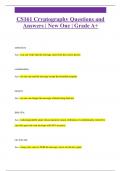
-
CS161 Cryptography Questions and Answers | New One | Grade A+CS161 Cryptography Questions and Answers | New One | Grade A+
- Exam (elaborations) • 3 pages • 2024
- Available in package deal
-
- $10.39
- + learn more
authenticity Ans: you can verify that the message came from the correct person confidentiality Ans: no one can read the message except the intended recipient integrity Ans: no one can change the message without being detected IND-CPA Ans: indistinguishable under chosen plaintext attack. definition of confidentiality where Eve can only guess the sent message with 50% accuracy. one time pad Ans: using a key once to XOR the message. n
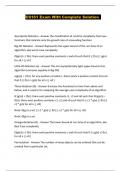
-
CS161 Exam With Complete Solution
- Exam (elaborations) • 33 pages • 2024
- Available in package deal
-
- $9.99
- + learn more
CS161 Exam With Complete Solution ...
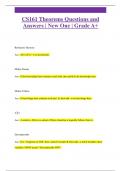
-
CS161 Theorems Questions and Answers | New One | Grade A+
- Exam (elaborations) • 3 pages • 2024
- Available in package deal
-
- $10.39
- + learn more
Refutation Theorem Ans: ∆╞ α iff ∆^¬α is inconsistent. Modus Ponens Ans: If the knowledge base contains α and α⇒β, then add β to the knowledge base. Modus Tollens Ans: If knowledge base contains α⇒β and ¬β, then add ¬α to knowledge base. ∆╞ α Ans: ∆ entails α, M(∆) is a subset of M(α), therefore α logically follows from ∆. Decomposable Ans: If α ^ β appears in NNF, then vars(α)∩vars(β)=∅. Basically, α and β shouldn't share variables. DNN...

$6.50 for your textbook summary multiplied by 100 fellow students... Do the math: that's a lot of money! Don't be a thief of your own wallet and start uploading yours now. Discover all about earning on Stuvia


